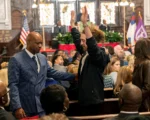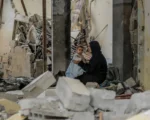People of Faith Need to Respect Human Lives and Not Worry About the Olympics
As a Palestinian Christian, Daoud Kuttab has often felt that defending symbolism can be an easy replacement for the practice of faith in action. He argues that this is certainly the case with a recent Olympics controversy.
Why Forced Posting of the Ten Commandments Weakens Both Church and State
Contributing writer Greg Mamula walks through the various biblical, theological, and civic concerns raised by Louisiana’s attempt to mandate display of the Ten Commandments in every public school classroom.
Spreading Post-Conviction Violence in Jesus’s Hijacked Name
Faithful America’s Rev. Nathan Empsall makes the case that Christian Nationalism poses multiple threats to the common good, but perhaps none are more dangerous than its misuse of Christianity to incite violence.
On Christians, Lies, and Not Fitting In
Christians often hear, share, and remember lies — but the light that exposes these lies doesn’t make their newsfeed. And this can make it difficult to be part of a faith community.
Melodies of Hope: Arab Christian Band Pays Tribute to the Heritage of Jordanian Hymns
A Jordanian worship band has made it their mission to perform and record hymns composed around the middle of the 20th century that might have otherwise been lost to time.
How Trump Turns His Trial Into a Show
Contributing writer Rodney Kennedy explores how the pilgrimages made by various politicians to Trump’s Manhattan trial are all about religion.
President Biden’s Last Chance to Stop the Nightmare in Gaza
Rev. Dr. Mae Elise Cannon of Churches for Middle East Peace argues we need a new foreign policy that stops alienating young people, Muslim and Arab voters, and millions of American Christians committed to justice.
A Palestinian Christian Plea for Compassion in Gaza
Levant Ministries CEO Dr. Fares Abraham makes the case that the Christian call for benevolence should not be contingent upon the intricacies of politics or theological disagreements.
The Candid Gospel
Contributing writer Sarah Blackwell considers the religious implications of rare photos that capture in-between moments — when we do not know someone is watching — in which our lives are truly lived.
Jerusalem: Holy Fire Spread to the World
Lauren Draper of Churches for Middle East Peace reflects on attending an ancient ceremony marking Orthodox Easter alongside Palestinian Christians in the midst of harsh restrictions from Israeli authorities.










